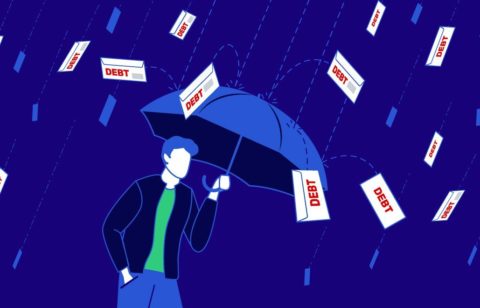You are struggling to keep up with credit card bills and other debt payments. As a result, you are understandably anxious. So, you feel relieved when you receive a call from someone promising to eliminate your debt. Unfortunately, this could be a debt relief scam.
These scammers typically prey on vulnerable people who are trying to get their finances back on track. In exchange for big upfront fees, they guarantee they can work magic with your debt and make it vanish or otherwise fix it. But the only thing that ends up vanishing is some of your hard-earned cash.
Here, we give you tips on how to spot a debt relief scam so that you can avoid becoming a victim.
What is a debt relief scam?
Debt relief scams take aim at people who are in financial dire straits, particularly credit card bills. Typically, these scams falsely assure someone that they can settle or reduce the person’s debt. But in many cases, a scammer will insist that a credit-burdened consumer pay a hefty fee before doing anything. Then, the scammer fails to deliver any debt relief at all and you are deeper in debt.
How can you spot a debt relief scam?
To keep from falling into a scammer’s trap, look for these six red flags:
1. The “debt relief” business contacted you first
If you get a call or email out of the blue from someone claiming to represent a debt relief company, it could be a scam. Most legitimate companies won’t contact a consumer unless they reached out to them first. Therefore, make sure you do some research and be cautious.
2. The “debt relief” business demands an upfront fee
When someone claiming to represent a debt relief company offers assistance, but insists that you first pay an upfront fee, you are almost certainly dealing with a scammer. If this happens to you, end the phone call immediately or ignore the message.
A legitimate debt relief company will never require upfront fees. In fact, federal rules prohibit a for-profit debt relief company from collecting fees before providing their services.
In order to charge a fee, a debt relief agency must have taken care of least one of a consumer’s debts and signed an agreement with the consumer, according to the Minnesota Attorney General’s Office. Also, the consumer must already have made at least one payment to a creditor as part of the written agreement.
3. The “debt relief” business applies pressure
Be on guard if you are told that you have a limited amount of time, such as 24 hours, to decide if you want to enroll in a debt relief program. A scammer uses this tactic in hopes of forcing you to make a quick decision — a potentially uninformed decision that could lead to you getting ripped off.
4. The “debt relief” business makes big promises
The Better Business Bureau suggests that if someone offers to remove negative information (such as a bankruptcy or late payment) from your credit report or makes similar promises, it should be a warning sign of a potential scam. Likewise, you should be suspicious if somebody guarantees they can improve your credit score or make your debt disappear. No company can realistically deliver on such promises.
Watch out for hyped-up statements like:
- “Get out of debt today!”
- “Totally repair your credit!”
- “Live debt-free without changing your lifestyle!”
5. The “debt relief” business holds back information
Federal rules require a debt relief company to provide certain information to consumers who are considering their services. If someone hesitates to offer details such as how long the program will last, how much it will cost and what the credit-scoring and legal consequences are, it is highly likely that they are a scammer.
How can you avoid debt relief scams?
You can take a number of steps to avoid debt relief scams, such as:
- Refusing to pay any upfront fees. A debt relief company isn’t supposed to require payment of fees until after it has started providing its services.
- Getting all agreements in writing. Unitus recommends“Carefully read contracts or finance agreements, and make sure you fully understand them before you sign.
- Doing your homework. If you are unsure about a business that says it specializes in debt relief, check with the Better Business Bureau or your state attorney general’s office to find out whether it is legitimate. Don’t rely only on the information published on a business’ website.
- Asking questions. Be sure to quiz a business about the fees it charges what to expect and other details of their debt relief program.
- Considering alternatives. If you have been spooked by a potential scam, you might try getting help with your debt by reaching out to your creditors or a nonprofit consumer credit counseling agency.
How do you find a reputable debt relief company?
You also have plenty of options to work with a reputable debt relief company (such as National Debt Relief). Here are four tips for finding a company that has your best interest in mind:
- Look for a company that doesn’t guarantee the outcome. A legitimate company won’t make any promises about reducing or eliminating your debts.
- Find a company that doesn’t ask for an upfront fee. Under federal rules, a legitimate company can only charge a fee after it has started providing services.
- Seek a company that won’t dodge questions. A legitimate company will provide clear, honest answers to your questions. In fact, the company might even suggest information you should inquire about.
- Check out the company. Search online for Better Business Bureau ratings and online reviews or complaints about any debt relief company you are thinking about doing business with.
There are scammers out there who are trying to put your money in their pocket. But if you do your homework, you can find an established debt relief company that wants to help you pay off your debt.







